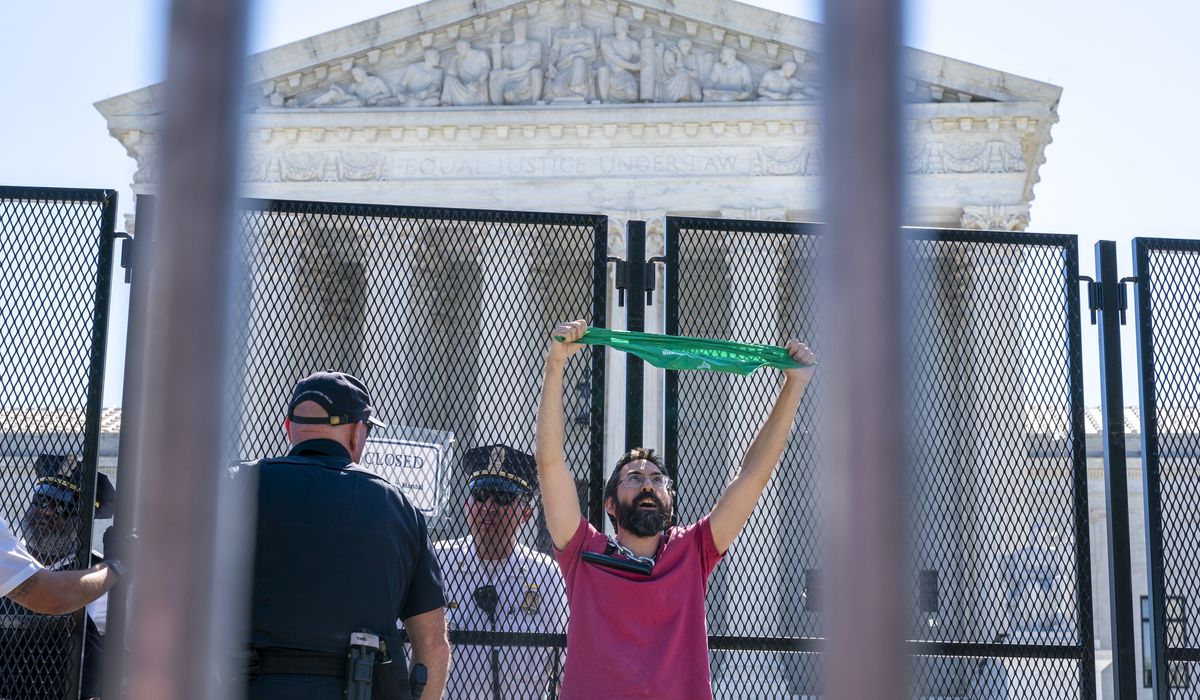
The Department of Homeland Security issued a terror alert Tuesday warning that anger over the chaotic U.S.-Mexico border or a looming Supreme Court decision on abortion rights could lead to more mass violence.
The department pointed to recent mass shootings in Buffalo, New York, and Uvalde, Texas, as evidence of a “dynamic” threat environment, suggesting that more attacks are lurking. Focal points include the November elections, the high court’s decisions and, particularly, anger over the border crisis.
“Some domestic violent extremists have expressed grievances related to their perception that the U.S. government is unwilling or unable to secure the U.S.-Mexico border and have called for violence to stem the flow of undocumented migrants to the United States,” the department said in a National Terrorism Advisory System bulletin.
“We assess that there is increased risk of domestic violent extremists using changes in border security-related policies and/or enforcement mechanisms to justify violence against individuals, such as minorities and law enforcement officials involved in the enforcement of border security,” the department said.
The bulletin delivered a grim assessment of America’s psyche, riven by political divisions and big questions about the direction of the country.
U.S. adversaries — particularly China, Russia and Iran — are feeding dissent, Homeland Security said.
SEE ALSO: Migrants found dead after smuggler abandoned truck along Texas highway
Still, the country’s decision-makers are providing plenty of fuel.
Analysts said both sides of the abortion debate could erupt into violence with a looming Supreme Court ruling that could overturn nearly 50 years of precedent.
Congressional elections two years after the chaos of the 2020 presidential contest could spark attacks on government institutions, political parties, candidates and the elections themselves, the department said.
Analysts described a country on edge after the spate of high-profile shootings.
“As recent acts of violence in communities across the country have so tragically demonstrated, the nation remains in a heightened threat environment, and we expect that environment will become more dynamic in the coming months,” Homeland Security Secretary Alejandro Mayorkas said.
The department listed a broad range of potential targets: religious institutions, racial or ethnic minorities, government buildings, media institutions and “public gatherings.”
SEE ALSO: ICE reunites illegal immigrant mother with baby held by smuggler
Homeland Security officials suggested that the most likely attacks won’t be conducted by organizations the government is monitoring.
“DHS continues to assess that the primary threat of mass casualty violence in the United States stems from lone offenders and small groups motivated by a range of ideological beliefs and/or personal grievances,” the department said.
The warning was issued just minutes before the Senate Judiciary Committee convened a hearing on the domestic terrorism threat from White supremacy in the wake of last month’s shooting in Buffalo.
Senators heard from a University of Chicago professor who studies political violence and said that, based on polling, nearly 20 million Americans believe President Biden “stole” the 2020 election and that use of force is justified to return Donald Trump to the White House.
“A key indicator of long-term political violence in a country is the pool of the population that sees political violence as justified, and so this figure is extremely concerning,” said professor Robert A. Pape.
The Homeland Security bulletin tied some of the increased risks of violence to false narratives that analysts said deepen divisions.
“The continued proliferation of false or misleading narratives regarding current events could reinforce existing personal grievances or ideologies, and in combination with other factors, could inspire individuals to mobilize to violence,” said Homeland Security, pointing specifically to the border situation.
Mr. Mayorkas has acknowledged that an “unprecedented” level of illegal activity at the border is straining the government’s abilities.
His department said a “perception that the U.S. government is unwilling or unable to secure the U.S.-Mexico border” could be a locus for violence.
Department analysts pointed to last month’s mass shooting at a supermarket in a Black community in Buffalo as an example of someone inspired by racist conspiracy theories about the powers that be seeking to threaten “the existence of the White race” through the promotion of minorities.
The department also identified threats from other ideological viewpoints. It cited a May attack on a Taiwanese community in California and an April attack on a New York City subway during rush hour. That subway incident drew praise on forums associated with al Qaeda and ISIS, Homeland Security said.
Al Qaeda and ISIS supporters also celebrated a January attack on a synagogue in Texas, analysts said. They concluded that online forums will continue to be platforms for inspiring those already in the U.S. to take up arms.
ISIS in April released an audio message calling for supporters to “avenge” the death of the group’s leader. Homeland Security said that message encouraged people to use knives or vehicles to kill.
The bulletin also repeated warnings that China, Iran and Russia are intent on sowing discord in the U.S. It said they will use online means to deepen social divisions, particularly through “conspiracy theories and false or misleading narratives.”
“As the U.S. 2022 midterm elections approach, malign foreign actors could bolster their messaging to sow discord and influence U.S. audiences in keeping with practices during previous election cycles,” Homeland Security said.
Concrete advice for average Americans to deal with the emerging threats was sparse.
Officials urged people to be aware of their surroundings and locate the nearest security and try to fortify their ability to spot misleading narratives.








